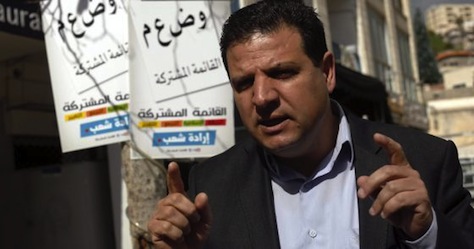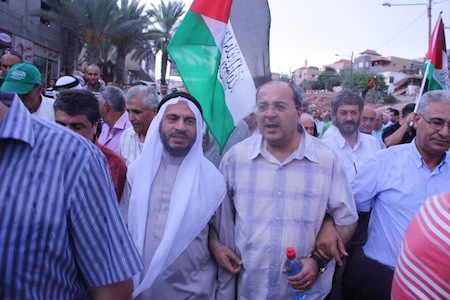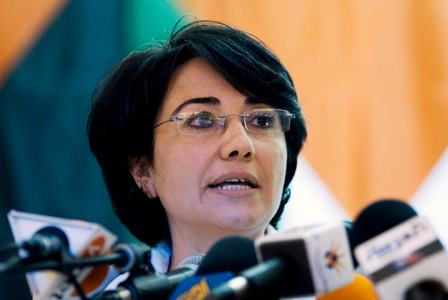 Photo credit to Atef Safadi/EFE.
Photo credit to Atef Safadi/EFE.
With just five days to go until the next Israeli general election, one party vying to win the third-largest bloc of votes, isn’t Zionist. It isn’t even necessarily Hebrew-speaking. ![]()
It’s the newly merged force of Israel’s four Arab parties, the ‘Joint List’ (القائمة المشتركة, הרשימה המשותפת). In addition to residents of the Palestinian territories, which include 2.7 million in the West Bank and 1.8 million in the more beleaguered Gaza Strip, Israel is home to an additional 1.7 million Arab citizens, nearly 20% of Israel’s total population (and expected to rise to 25% shortly), who have full citizenship rights to participate in voting, though many Israeli Arabs have described the hardships of living in an officially Jewish state in the Middle East, surrounded by a handful of often hostile Arab neighbors.
Under the leadership of Ayman Odeh (pictured above), a 41-year-old attorney from Haifa, the Joint List is emerging with surprising momentum as the Israeli campaign ends. Odeh himself is the new leader of the leader of Hadash (الجبهة or חד”ש, ‘New’), a longstanding socialist Jewish-Arab unity party with roots in the Israeli Communist Party. Odeh fell short of representing Hadash in Israel’s 120-member, unilateral coalition, the Knesset (הכנסת), after running sixth on the party’s candidate list in 2013, but could lead the Joint List to 13 seats or more after the March 17 election.
* * * * *
RELATED: Who is Isaac Herzog? A look at Israel’s opposition leader.
* * * * *
Odeh is attracting Arab voters in large numbers, and even a handful of Jewish voters, with his emphasis on leftist economic policies to address inequality and other social justice issues in Israel, stealing the thunder from political leaders like former communications minister Moshe Kahlon, who founded a new center-right party, Kulanu (כולנו, ‘All of Us’), and, until recently, finance minister Yair Lapid, who founded the centrist party Yesh Atid (יש עתיד, ‘There is a Future’).
With polls showing a tight race between prime minister Benjamin Netanyahu’s center-right Likud (הַלִּכּוּד) and the ‘Zionist Union’ between Isaac Herzog’s center-left Labor Party (מפלגת העבודה הישראלית) and former justice minister Tzipi Livni’s supporters, the Joint List is among the candidates vying for third place. That could make Odeh and the Israeli Arabs, for the first time in decades, a constituency with the power to make or break Israel’s next government.
If, as some commentators have argued, Israeli president Reuven Rivlin will call on Netanyahu and Herzog to form a unity government, that would also make Odeh’s coalition the official opposition in the world’s only Jewish state — an Arab coalition comprised of hardcore Islamists and longtime communists. That result might even legitimize Israeli democracy in the eyes of many who have become disillusioned with Israel’s decades-long occupation of the Palestinian territories. Continue reading Israeli Arabs unite with fresh voice for non-Jewish voters

